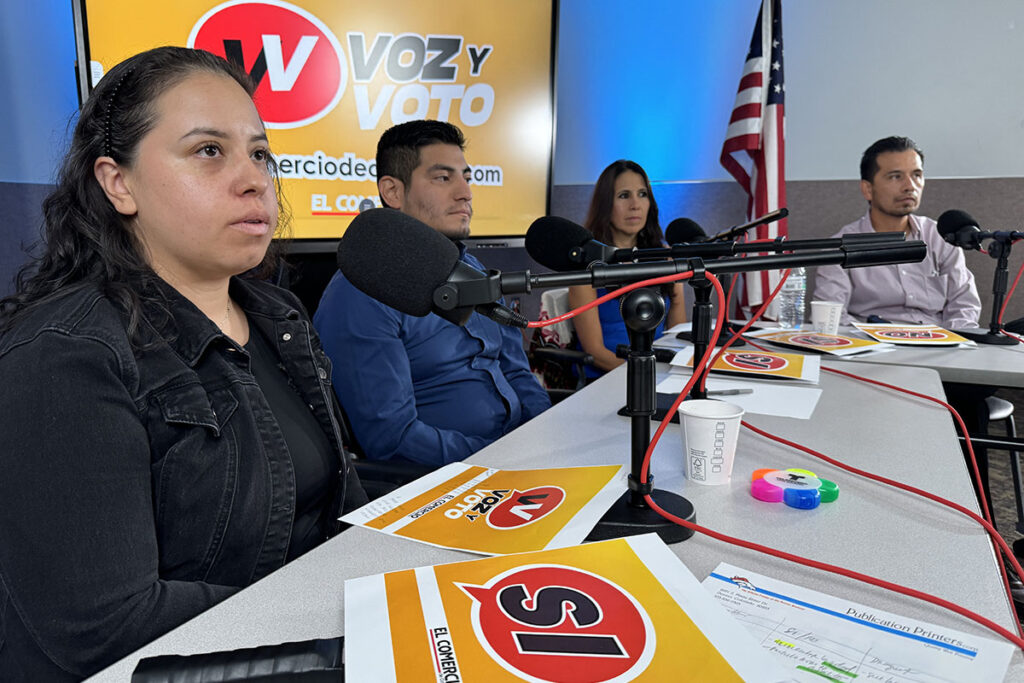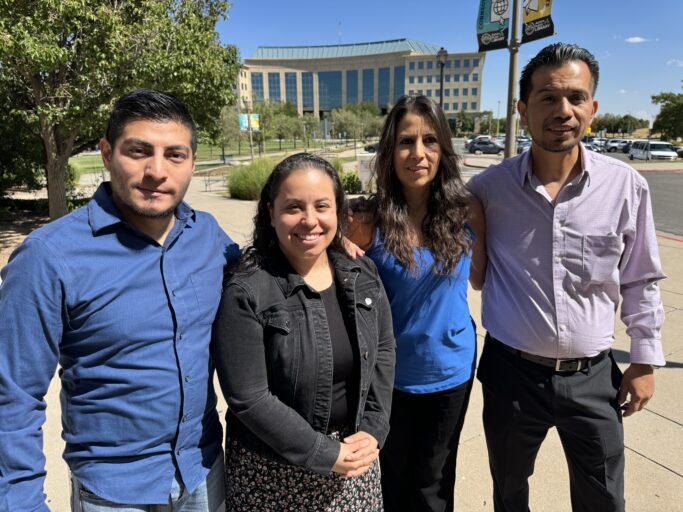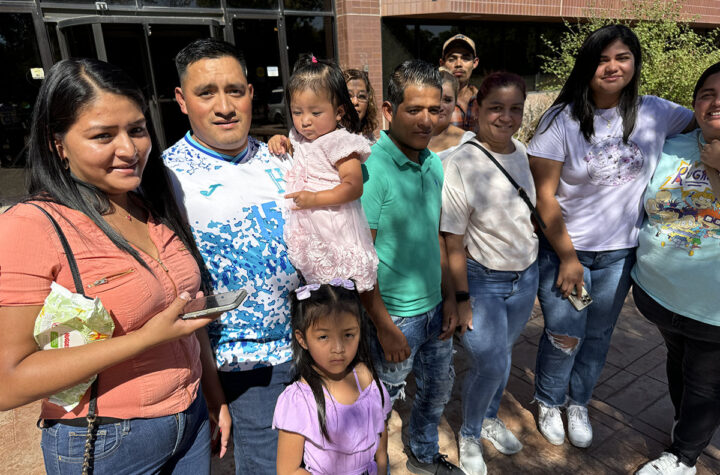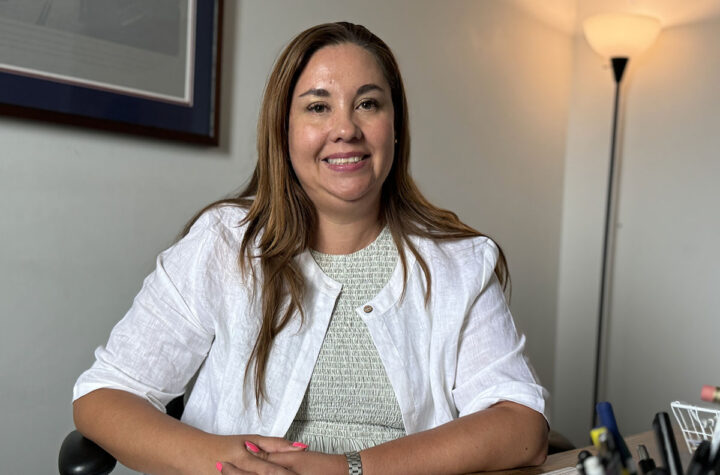
VOTERS FROM DISTRICT 6 IN COLORADO REJECT MASS DEPORTATIONS
HISPANIC VOTERS – DISTRICT 6 | Esther Turcios, Salvador Cazún, Guiliana Day, and Vladimir Martinez. (Picture/El Comercio de Colorado)
HISPANIC VOICES ADVOCATE FOR COMPREHENSIVE IMMIGRATION REFORM
Newsroom El Comercio de Colorado
In a recent conversation organized by El Comercio de Colorado as part of the “Voz y Voto” initiative, four Hispanic voters from District 6 in Colorado expressed their rejection of the proposal for mass deportations in Aurora. This proposal was announced by former president Donald Trump, who has mentioned his intention to carry out such deportations as part of his electoral campaign.
However, the participants in this discussion expressed concern and proposed a more humane and constructive approach to addressing immigration. Esther Turcios, Vladimir Martínez, Giuliana Day, and Salvador Cazún participated in this conversation. They all agreed that mass deportations are not the solution and emphasized the need for immigration reform that is fair and respectful of human rights.
VOZ Y VOTO| Hispanic Voters of Colorado District 6: Esther Turcios, Vladimir Martínez, Giuliana Day, and Salvador Cazún. (Vídeo/El Comercio de Colorado)
Provide opportunities and issue work permits
Esther Turcios, who was born in Aurora and works in tax-related issues, highlighted the importance of not criminalizing the immigrant community. “This is a country where the American dream is a reality for many. Denying people that opportunity feels like a crime,” she said. For her, closing the borders is not the solution, and she stressed the need for accurate information to avoid stigmatizing immigrants. Esther also pointed out that many immigrants come seeking a better life and should be given the chance.
Vladimir Martínez, on the other hand, proposed an approach that includes work permits for those who want to come to the United States with the goal of working and then returning to their countries of origin. “Most people want to return to their countries… what they want is the dream of their own country,” he commented. Vladimir emphasized that instead of mass deportations, mechanisms should be established that allow immigrants to integrate and contribute to society in an orderly and legal manner.
Regulated and temporary closure
Giuliana Day stressed the importance of addressing immigration in a regulated manner to avoid the exploitation and risks faced by people crossing the border irregularly. “There are women who cross the border and are raped, there are children who are sold into sexual trafficking. If we do it in a regulated way, there won’t be exploitation,” she expressed. Giuliana also highlighted the need for immigration reform that offers a comprehensive solution for those already in the country.
Salvador Cazún, who also supports the idea of temporarily closing the borders to establish more effective mechanisms, called for an understanding that not all immigrants are responsible for the increase in crime. “I totally disagree with the notion that immigrants have brought criminality,” he said. Salvador advocated for regulation that allows for the identification of people who genuinely want to integrate and contribute to the country’s development.
Avoid stigmatizing immigrants
All participants agreed on the importance of avoiding the stigmatization of immigrants and on the need for immigration reform that offers real and humane solutions. They rejected the idea that the arrival of immigrants is the main cause of the increase in crime in Aurora and emphasized that the immigrant community also contributes to the social and economic fabric of the district.
This dialogue shows that Hispanic voters in Colorado’s District 6 are seeking comprehensive and fair solutions to the immigration issue and reject mass deportation policies as a simplistic and ineffective response to current challenges. El Comercio de Colorado’s “Voz y Voto” initiative continues to bring the voices of the Hispanic community to the public conversation, highlighting the diversity of opinions and the commitment of citizens to issues affecting their community.

AT AURORA CENTRAL LIBRARY| Salvador Cazún, Esther Turcios, Giuliana Day and Vladimir Martínez. (Picture/El Comercio de Colorado)
Key Figures
Twenty-two percent of the residents of Colorado’s District 6, which includes cities like Aurora, Centennial, Littleton, and Brighton, are Hispanic. The presence of Hispanics and other ethnic groups results in 26 percent of households in the district speaking a language other than English.
The district’s economy is based on services and urban activities. However, there are some areas dedicated to energy production and agriculture. According to the 2020 census, 45 percent of residents hold a high school diploma. Meanwhile, 60 percent of the population lives in rental housing. In this district, 10.6 percent of the people live in poverty.

THE UNIVERSITY OF COLORADO ANSCHUTZ MEDICAL CAMPUS| A landmark in Colorado’s Congressional District 6, drives groundbreaking advancements in medical treatments and cures. (Picture/CU-Denver)






otras noticias
Honduras inaugurates consulate in Aurora, Colorado
Asylum restriction divides Hispanic voters
Yadira Caraveo: “Political asylum must be protected responsibly”